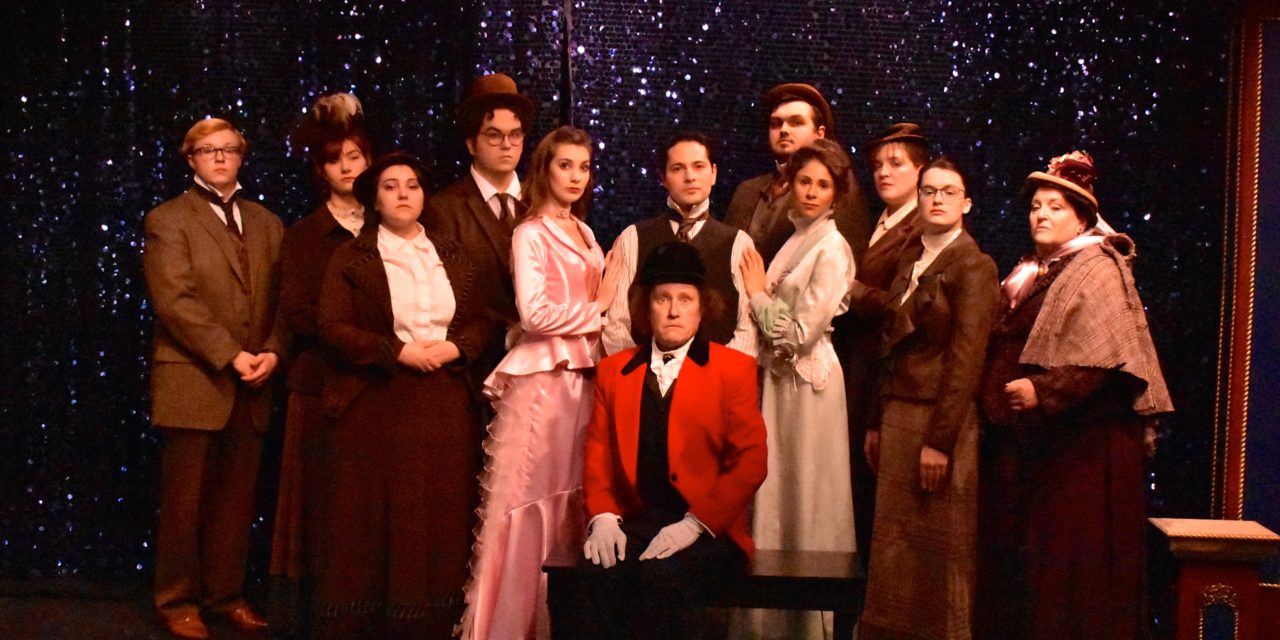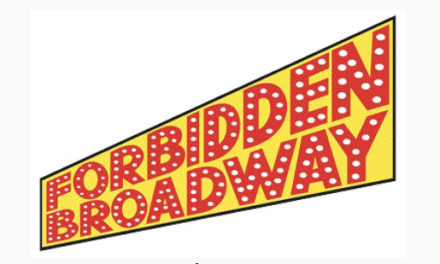(Above: The cast of Actors Cabaret of Eugene’s A Gentleman’s Guide to Love and Murder; photo by Jim Roberts)
By Kelly Oristano
Montague Navarro is the sort of man who could be alone in a room with no chairs and still not know where he stands. A Gentleman’s Guide To Love And Murder, the 2014 Broadway hit now making its Oregon debut at Actors Cabaret, is the musical story in which Monty Navarro finds his destiny, or maybe his destiny finds him. Perhaps they meet in the middle.
From the jump Monty is already getting squeezed on all sides. Turn of The Last Century England heaps a lot of expectations on a single young man. Financial, Romantic and Social pressures are simmering away when Monty learns from a mysterious Miss Shingle that he’s a D’Ysquith on his mother’s side and 8th in line for the title of Earl. (If this sounds familiar it’s because the play shares source material with Kind Hearts and Coronets, and one actor plays most of the D’Ysquiths as Alec Guinness played all the D’Ascoynes. There was indeed some litigation between parties before Gentleman’s Guide was allowed to proceed into its original production.) Despite some anger about being shut out of his lineage, Monty doesn’t set out on a killing spree right away. First, he attempts to get back in the D’Ysquiths good graces, seeking perhaps some gainful employment in their stockbroking firm.
But when the D’Ysquiths respond to his entreaties with threatening Cease-and-Desist letters, Monty ups his game. And it’s here that the show falls into a bit of a pattern: Monty meets a D’Ysquith, they sing a song revealing that the D’Ysquith in question is a comically terrible person, so much so that the audience won’t mind either when Monty kills them or, often, won’t mind when the offending D’Ysquith dies by tragicomic accident while Monty is considering just how best to kill them. This D’Ysquith is a pervy and immoral vicar, that one a fox hunter who’d rather be hunting the poor, over there’s a well-intentioned woman whose international philanthropy is cloaked in horrible bigotry. But it’s all very breezy and dry and of course they all get their funny comeuppances. Frankly as a matter of drama it plays a little pat, but we’re not here for drama.
What we are here for is a musical spectacle told in set pieces and starpower, and director Joe Zingo does a bang-up job of making the most of ACE’s strengths here. The tiny stage has been given more depth than it often has and been designed to beautifully resemble all the Edwardian drawing rooms and parlors and gardens that it will represent. The wardrobe is mostly excellent and on point; the costuming of the various dying D’Ysquiths is particularly keen.
ACE has neither the space nor the technical capabilities to do the million-dollar stagecraft that made the Broadway run such a smash, but the set pieces still come off well. An ice skating scene and a quick door farce involving Monty and the two women who are squeezing him along with the rest of society were particularly well done, as was the funeral scene which opens the second act.
The pattern of deaths breaks a bit in Act Two. Monty and everyone else who’s still living end up guests of the current Earl and Lady Highhurst. More deaths, a trial, and a comically rapid denouement left the audience happy and hungry enough for more.
The cast is solid throughout, with some standouts. Gaylord Walker is hilarious and shows extraordinary range as eight disparate D’Ysquiths. My personal favorite was Asquith D’Ysquith Senior, the only one who treated Monty with some tenderness, but my date for the evening liked Adalbert D’Ysquith, a classic poor-hating fox-hunting laughably oblivious caricature of the worst of British wealth. Walker can sing talk à la Rex Harrison, sing sing like Christopher Plummer or do convincing drag like a Pythoner or Kid in The Hall, all with equal ease and skill, and over the evening shows a half dozen other remarkable shades as well.
Cody Mendonca as Monty D’Ysquith Navarro carries the show from D’Ysquith to D’Ysquith; a huge amount of our investment in the story comes from Mendonca conveying Monty’s wild reaction to superhuman stressors. His patter songs are funny and his delight in seeing things turn his way is infectious.
Foremost among Monty’s many stressors are the various women in his life. Ashley Apelzin is fantastic as Phoebe D’Ysquith: melodic, clever, and funny. Ashlee Winkler is a staid and perceptive Sibella, with wonderful vocal control. Sibella delivered my favorite lyric: “Do you hate these earrings? Now, the truth. Don’t be kind. I don’t mind because I hate them too.” We know everything we need to know about her in just under 20 words. Kathy Bowman is funny and in wonderfully full voice as Monty’s mysterious benefactor Miss Shingle.
The Ensemble is excellent. They seemed to have great fun adding character to the proceedings. I would have liked to see them do even more.
It really does hurtle so fast toward it’s winky didn’t-that-wrap-up-ever-so-nicely conclusion that I almost can’t remember how it ends, but there is in the last act a nod toward a theme about erasure and the anger that personal erasure causes — the idea that the initial act of violence was against Monty, not by him. It’s not delved into deeply, but it is a deep, and universal, and important idea. And it’s buried in possibly the funniest, politest, most musical murder spree since Sweeney Todd shaved the same streets clean 124 years before.










